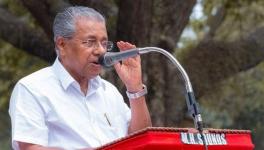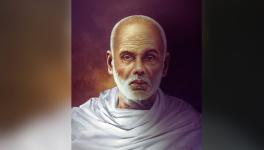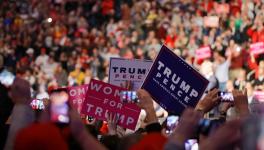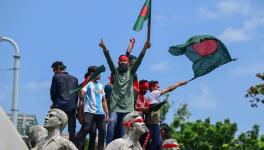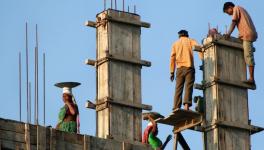The Politics of Football: From Interwar Fascism to Malabar’s Cosmopolitanism
A football stadium in Kozhikode, Kerala | Dec 2022
The history of modern football dates back to the second half of the 19th century, as it spread from England to Latin America and other parts of Europe. Initially confined to elitist spaces, it was gradually popularized by the working-class laborers. Football was then born into class conflict, and class struggle popularized it. They took football from confined spaces to mass galleries. The working class recognized football as a means of their livelihood. Though it was intended as a leisure time activity for elites and a method to spread the Church’s moral values, the poor converted football into an art that provided livelihood.
Class struggle and revolution have always always been linked to football from its very birth. History tells us about the use of sports, especially football, as a tool to repress protests against authorities. This method of football-related propaganda or football as a political tool began with Italy’s Benito Mussolini, founder and leader of the National Fascist Party. Later, Adolf Hitler in Germany, and Francisco Franco in Spain followed this strategy. Though FIFA often repeats that politics has no place in football stadiums, these two have remained intertwined since the sport’s inception. Football is an ironic political phenomenon that can be read along with fascism, colonialism and anti-colonial and fascist resistance.
After the French Revolution and the fall of the Ottoman Empire, Tsars and Austro-Hungarian imperialism, nationalist sentiment began to flare up in Europe at the beginning of the 20th century. With the formation of FIFA in 1904, football moved from clubs to international arena, and was soon utilized as a device to instill nationalism in the masses. Watching one’s country leading in international sports arenas like that of football’s aided the nationalist sentiment in a great way. In this way, the Olympics and the World Cup turned out to be sites of violent assertions of nationalism.
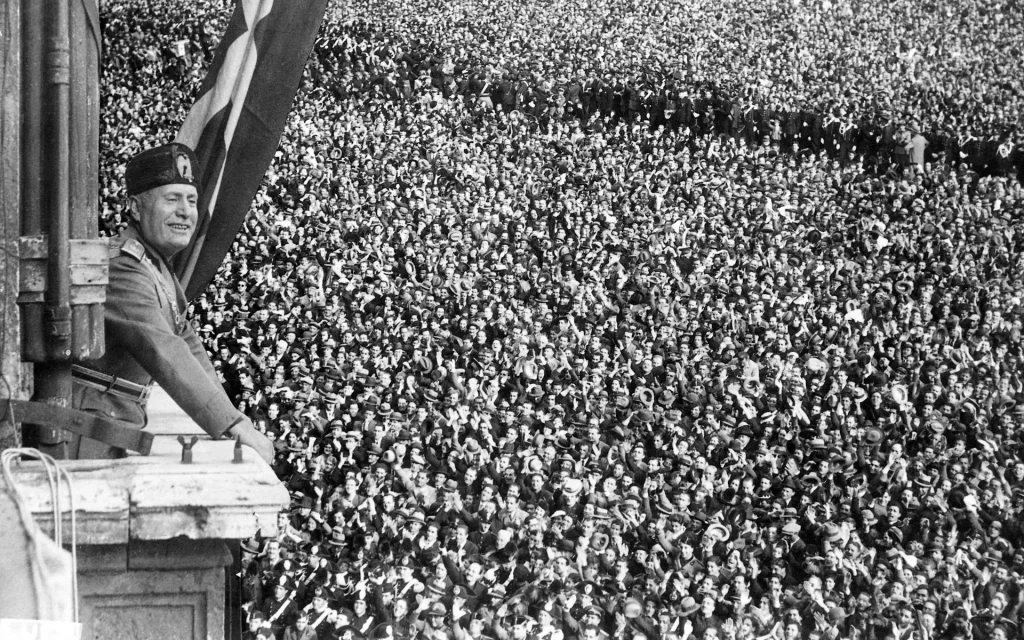
Benito Mussolini
Mussolini was the first political leader to recognize the power of football to easily ignite hyper-nationalism or jingoism. Thus, football, initially used in the 20th century to inculcate a sense of morality and ethics among Christian men, moved to the political arena with Mussolini’s actions.
Mussolini’s social engineering and Hitler’s mob passion
Mussolini came into power in Italy in 1922. As a former journalist, Mussolini knew how to reshape public consciousness very well. He was aware of how media could be used to construct propaganda useful for social engineering. The first World Cup (1930) was held at a time when Mussolini’s implementation of fascist ideas and policies began to take effect. He closely observed how nationalism was found and felt in sports galleries. Mussolini recognized that hyper-nationalism was vital to preserve fascism. For this, he effectively took advantage of the victories in the 1934 and 1938 World Cups and the 1936 Olympics.
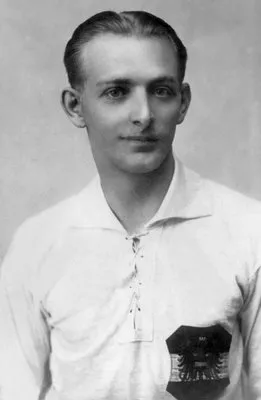
Matthias Sindelar
When Italy won the World Cup in 1934, the the mouthpiece of the ruling party (the Il Popolo d’Italia newspaper) presented the victory with the title “Vision of Harmony, Discipline, Order and Courage”, indicating that the ruling classes stood above the players and commands of the government, and that discipline and order were the secrets of the team’s success. What the Italian press printed was true, as Italy’s victory in the World Cup was not due to the prowess of the players, but it was achieved by influencing the referees and overthrowing the World Cup organization. Several fascistic ideological symbols like the Roman salute were incorporated into the posters of this World Cup. Even a new trophy named “Coppa Del Duce” was introduced, besides the usual Jules Rimet trophy. Coppa Del Duce was six times bigger and replete with fascist ideological imprints. Mussolini interfered in the results too – he directly decided the judgement of each game. Referees who controlled the quarter-final match between Italy and Spain were suspended alleging partiality. Even the Austrian team with good players like Matthias Sindelar could not dodge failure against Mussolini’s circles of power. Austria was defeated using a referee named Ivan Eklind, who became Mussolini’s favorite through this game and later controlled the final match with Czechoslovakia.
Similarly, Hitler too had recognized the significance of sports and galleries in contributing to building hyper-nationalism. He used the Berlin Olympics of 1936 like Mussolini used the 1934 World Cup. Hitler was at the helm of the promotion and organization of the games, and as a result, Germany accumulated all the medals. However, USA’s Jesse Owens broke through Hitler’s influence and propaganda, to win a gold in 100 meters. As expected, Hitler was disturbed by the fact that a Black athlete won a medal in the Olympics held in Germany. He responded, “savages and immoral like blacks should not be allowed to compete with the upper class and sophisticated.”
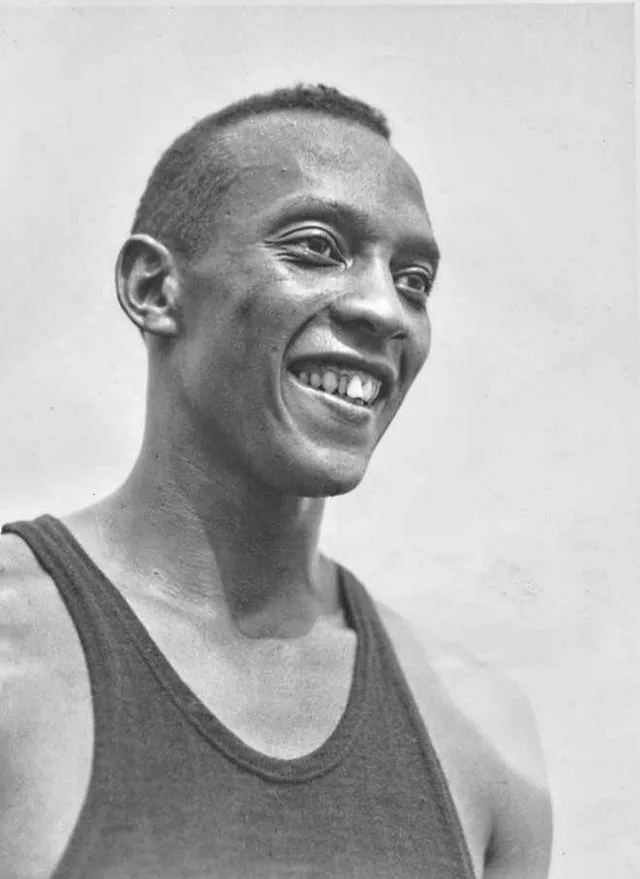
Jesse Owens
In 1938, the German Army conquered Austria. Hitler used this opportunity to make Germany’s football team stronger, by building a team consisting of both Austrian and German players. Some Austrian footballers like Matthias Sindelar were not ready to compromise and live according to the dictator’s rules, and the friendly match between Austria and Germany ended with Austria’s victory. Sindelar scored a winning goal despite all the threats he faced from the fascists. He was found murdered a year later at the age of 36, recorded as “pro-Jewish” and “socialist” in Nazi files.
As the ball advances through the right-wing turf
As in the 20th century, the use of football by the right-wing can be seen today as well. Turkish President and populist leader Recep Tayyip Erdogan’s affinity for football can be read along with this. However, Erdogan’s love for football did not take birth in politics. If you look at his youth in the 70s, Erdogan was a semi-professional player, who wore the armband of captaincy for IETT, football club of the Istanbul Electric Tram and Tunnel company. In 2018, Turkish-born German midfielder Mesut Ozil faced racist slurs because of his friendship with Erdogan, but this friendship can only be read as part of Erdogan’s passion for the sport. Though Hungarian Prime Minister Viktor Orban made political gains through football, his connection with football dates back to his childhood. Orban was Videoton FC’s youth team player in his youth and is the current owner of the club. Brazil’s Jair Bolsonaro – who came into power in 2018 as a member of the Social Liberal Party – is also a politician who exploits football for politics. An imperialist who worked in the USA’s interests, Bolsonaro used the support he received from Brazil’s iconic players for his election victories. This year too, players like Thiago Silva, Neymar and Dani Alves declared their support for Bolsonaro’s election campaign.
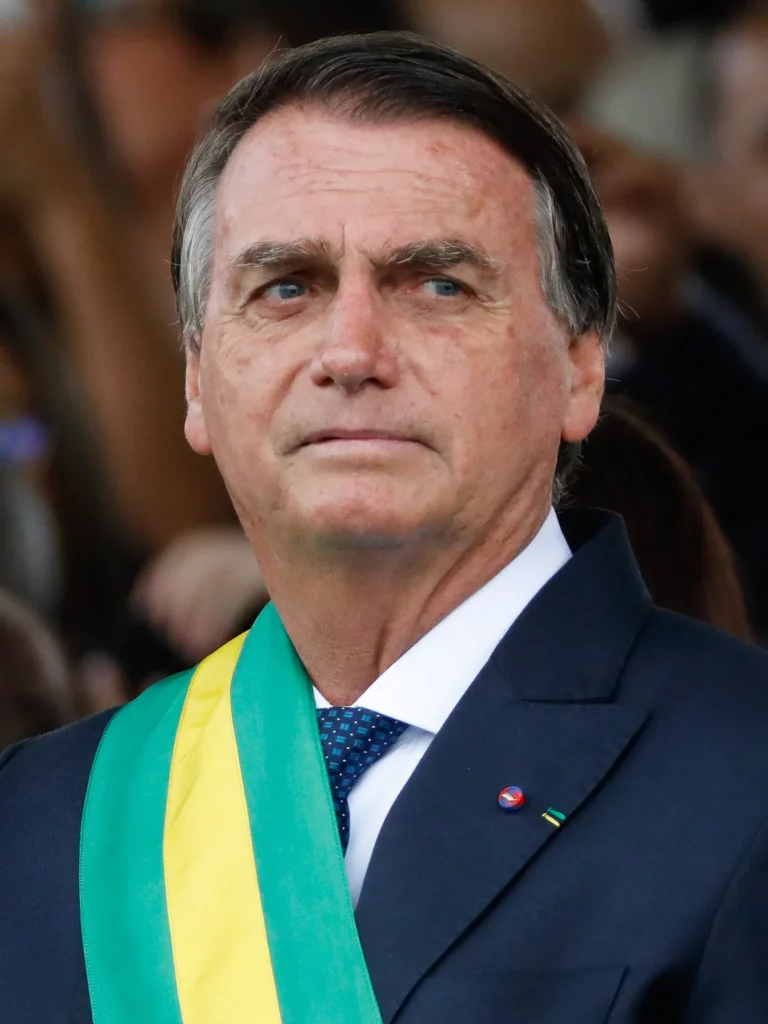
Jair Bolsonaro
The contemporary political scenario in India, where extremists determine a sportsman’s levels of nationalism according to his religion/caste is not very different from fascist Italy or Germany. Najeeb, a student of the Jawaharlal Nehru University in New Delhi, is representative of the Indian version of disappeared youth in Argentina under Jorge Rafael Videla, a military dictator who used the 1978 World Cup to meet his political goals. The photographs of Sharjeel Imam and Sanjeev Bhatt are similar to those of detained political prisoners at Buenos Aires’ Army Mechanical School – representing the repetitive history of fascist regimes. Extreme nationalism started to gain prominence in Indian sports galleries after the Sangh Parivar’s rise to power, which injected anti-Muslim hatred and casteism into the country’s public sphere, resulted in athletes and artists from minority communities continuously facing communal abuse. If it was football in Europe, cricket is the trump card of nationalists in India. When India lost to Pakistan in the 2021 T20 World Cup held in UAE, Muhammed Shami was forced to prove his patriotism. The former Indian opener Wasim Jaffer resigned from his position as Uttarakhand’s Ranji Trophy team coach after facing racist abuse. When India’s Arshdeep Singh dropped a catch against Pakistan’s Asif Iqbal, he was declared a “Khalistani” by right-wingers.
Football against colonialism and fascism
Democrats and anti-fascist fighters too have used football, be it in Asia, Latin America, or in Europe. In 1982, Brazilian player Socrates appeared in a Corinthians jersey, calling for voting against totalitarianism when Brazil was under a dictatorship. On behalf of the Malvinas island that lost in the war against England in 1982, the Argentine people asked for justice through the 1986 World Cup quarter-final. The same weapon used to colonize was being used to further postcolonial discourse – a sublime example of the greatness of football’s political history.
Football and cosmopolitanism in Malabar
Kerala, especially Malabar which has been the center of rising anti-colonial sentiment during British rule, received Diego Maradona’s 1986 goal with open arms. The politics behind the phrase “Hand of God” was being discussed across the world, and Maradona too became a favorite of Malayalis, the people of the State.
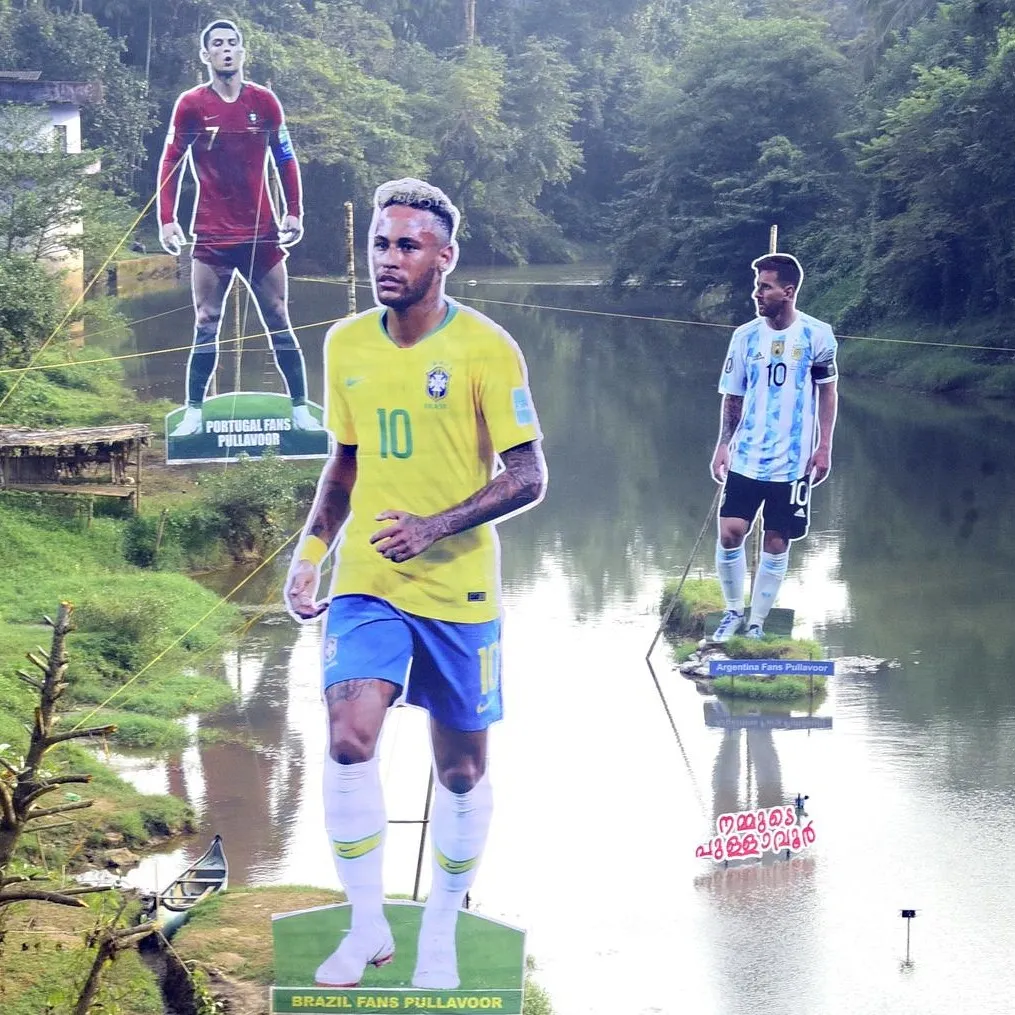
Cut-outs in Kozhikode, Kerala | Dec 2022
Malabar’s anti-colonialism is as old as football itself. In 1836, a special police camp was set up in Malappuram to repress anti-British uprisings. It was through the Malabar Special Police (MSP) department that the people of Malappuram came to know about football. Maradona’s ideological stand in accordance with Fidel Castro, Che Guevara and the world’s working classes created a special place for him in the hearts of Kerala’s leftist youth. Beyond politics, Malabar’s unique fighting spirit resonated with fast-paced football. The same football which was utilized to promote hypernationalism in Italy, Argentina and Germany, was now teaching the first lessons of universality and cosmopolitanism to the Malayali.
Travelling through Malabar’s villages like Nainamvalapp and Areecode during the World Cups, one can get a glimpse of this passion – houses and bus stops painted in colors of the flags of Argentina, Brazil, Germany, Portugal and England; giant cut-outs of iconic footballers etc. Naturally, the question of rooting for others’ countries will arise. There are many living examples to answer this. Despite Argentina’s victory over the USSR in the World Cup of 1990, Malappuram’s Hussain “Kaka” (brother) was depressed – for he was at a time an ardent Stalinist as well as an Argentina fan. I happened to hear about Kaka’s mental conflict in a recent discussion on football. Beyond a blind worship of a nation, class consciousness stemming from ideology was the basis of Kaka’s conviction. It has only been some weeks since the Workers’ Party leader, Lula da Silva, came into power by defeating Bolsonaro in Brazil. Many Malayalis celebrated this victory as a victory of the working classes everywhere. Beyond seas and continents, finding happiness in the success of the working class in another nation is true universality.
In India, the far-right creates communal tension every day. At such a vulnerable period, the World Cup is taking place in Qatar, a Muslim-majority country. This has been met with criticism, and the Western media’s attempt to defame Qatar is another example of imperialists’ anti-Muslim hatred. In India, someone pens some good words about a Pakistani player, he is declared a traitor; if the Indian team captain stands in solidarity with a team member from a minority community, his eight-month-old daughter faces rape threats. In an India like this, Kerala’s internationalism, evident in their passion for football, is the greatest slogan for the 2022 World Cup.
This article was written by Jabir K Noushi and translated from Malayalam by Farida Mohamed. It was originally published on Student Struggle.
Get the latest reports & analysis with people's perspective on Protests, movements & deep analytical videos, discussions of the current affairs in your Telegram app. Subscribe to NewsClick's Telegram channel & get Real-Time updates on stories, as they get published on our website.









